- Home
- Gregory Maguire
Wicked: The Life and Times of the Wicked Witch of the West Page 38
Wicked: The Life and Times of the Wicked Witch of the West Read online
Page 38
“Haven’t you ever heard of a mad Cow?” she answered. “Sweetheart, my udder is sore from their daily yanking. I am tapped for milk morning and night. I won’t even go into what it’s like to be mounted by a—well, just never mind. But worst, my children have been fattened on milk and slaughtered for veal. I could hear their cries from the abattoir, they didn’t even bother to move me out of hearing range!” Here she turned her head to the wall, and the Sheep came up on either side of her, pressing like a living pair of warm bookends against her lower sides and underbelly.
Elphaba said, “I can’t be sorrier or more ashamed. Look, I was working with Doctor Dillamond—have you heard of him?—in Shiz, years ago. I went to the Wizard himself to protest what was happening . . .”
“Oh, the Wizard doesn’t show himself to the likes of us,” said the Cow, after she had regained her composure. “I don’t feel like talking anymore. Everybody’s on your side until they want something from you. The Eminent Nessarose has probably brought us in order to impress us into some religious ceremonial procession. My silken flanks tarted up with garlands or the like. And we all know what happens next.”
“Now you must be wrong in that,” said the Witch. “I do object. Nessarose is a strict unionist. They don’t go in for—blood sacrifice—”
“Times change,” said the Cow. “And she’s got a population of ill-educated, nervous subjects to pacify. What, pray tell, works better than ritual slaughter?”
“But however could it come to this?” said the Witch. “Assuming you’re telling the truth? This is farming country. You ought to be well established here.”
“Animals in pens have lots of time to develop theories,” said the Cow. “I’ve heard more than one clever creature draw a connection between the rise of tiktokism and the erosion of traditional Animal labor. We weren’t beasts of burden, but we were good reliable laborers. If we were made redundant in the workforce, it was only a matter of time before we’d be socially redundant too. Anyway, that’s one theory. My own feeling is that there is real evil abroad in the land. The Wizard sets the standard for it, and the society follows suit like a bunch of sheep. Forgive the slanderous reference,” she said, nodding to her companions in the pen. “It was a slip.”
Elphaba threw open the gate of the pen. “Come on, you’re free,” she said. “What you make of it is your own affair. If you turn it down, it’s on your own heads.”
“It’s on our own heads if we walk out, too. Do you think a Witch who would charm an axe to dismember a human being would pause over a couple of Sheep and an annoying old Cow?”
“But this might be your only chance!” Elphaba cried.
The Cow moved out, and the Sheep followed. “We’ll be back,” she said. “This is an exercise in your education, not ours. Mark my words, my rump’ll be served up rare on your finest Dixxi House porcelain dinner plates before the year is out.” She mooed a last remark—“I hope you choke”—and, tail swishing the flies, she meandered away.
6
An ambassador from the Glikkus, darling,” Nessarose said, when Elphaba demanded a meeting. “Really, I can’t turn her away. She’s come to discuss mutual defense pacts in the event that the Glikkus secedes next. She thinks there are agents trailing her family, and she needs to leave on her return journey tonight. But we’ll dine together, just like old times? You, me, and my server?”
Elphaba had no choice but to while away another afternoon. She located Frex and persuaded him to go for a stroll out beyond the ornamental ponds and pristine lawns, where the woods came up to the back edge of Colwen Grounds. He walked so stiffly, so slowly, it was torture; she was a strider. But she kept herself in check.
“How do you find your sister?” he asked her. “After all these years? Much changed?”
“She was always confident, in her way,” Elphie said reservedly.
“I never thought so, and I don’t now,” Frex said. “But I think it was a good act, and it’s gotten better.”
“What really did you ask me to come here for, Papa?” Elphaba said. “I haven’t much time, you know. You must be frank.”
“You would make a smarter Eminence than Nessie,” he said.
“And it’s your birthright. Yes, I know the strict rules of title inheritance weren’t important to your mother. I just think that the people of Munch-kinland would do better with you at the helm. Nessa is—too devout, if such a thing exists. Too devout to be a central figure in public life, anyway.”
“This may be the only respect in which I take after my mother,” Elphaba said, “but an inherited position is of no interest to me, and it carries no weight at all that I’m the rightful Eminence. I’ve long ago abdicated my position in the family in that respect. Nessarose has every right to abdicate hers, and then Shell can be located to stand in. Or better yet, the foolish custom can be abolished, and let the Munchkinlanders govern themselves to death.”
“Nobody ever suggested a leader isn’t just as much a scapegoat as a lowly peon,” said Frex. “Anyway, it’s possible. But I’m talking about leadership, not about rank and privilege. I’m talking about the nature of the times we live in, and the job that needs to be done. Fabala, you were always the more capable sibling. Shell is a madcap cutup, currently playing secret agent, and Nessie is a bruised little girl—”
“Oh please,” she said in disgust. “Isn’t it time to get over that?”
“She hasn’t,” he said, hurt. “Do you see her wrapped in some lover’s arms? Do you see her bearing her own children, engaging in life in a way that makes sense? She hides behind her devotion the way a terrorist hides behind his ideals—” He saw her flinch at this, and paused.
“I have known terrorists capable of love,” she said evenly, “and I have known good maunts, unmarried and childless, doing charity for stricken people.”
“Have you known Nessa to have an adult bond with anyone other than the Unnamed God?”
“You’re one to talk,” she said. “You had your wife and your children, but they came lower on the order of priorities than Quadlings waiting to be converted.”
“I did what had to be done,” he said rigidly. “I won’t be lectured by my daughter.”
“Well, I won’t be lectured by you about my everlasting duties to Nessie. I gave her my childhood, I got her going at Shiz. She’s made her life the way she wants it, and she still has choice and free will even now. And so do her subjects, who can depose her and cut off her head if her prayers get in their way.”
“She is a rather powerful woman,” Frex said sadly. Elphie glanced sideways at him, and for the first time she saw him as feckless—the kind of old man that Irji, if he survived, would grow to be. Constantly pawing at the edge of events, reacting instead of acting, mourning the past and praying for the future instead of stirring up the present.
“How did she get so powerful?” she asked, trying to be kind. “She had two good parents.”
He didn’t answer this.
They walked on and came out of the woods along the edge of a cornfield. A couple of farmhands were repairing a fence and erecting a scarecrow. “Afternoon, Brother Frexspar,” they said, doffing their caps. They looked a little askance at Elphaba. When she and her father had continued out of earshot, she said, “They were wearing a little talisman or something on their tunics, did you see it? It looked like a small straw dolly or something.”
“Oh yes, the straw man.” He sighed. “Another pagan custom that had almost gone underground, and then was revived during the Great Drought. Ignorant field-workers wear a straw man as a charm against the pests of crops: drought, crows, insects, rot. Once upon a time there was a tradition of human sacrifice about it.” He paused to catch his breath and wipe his face. “Our family friend, Turtle Heart, the Quadling—he was butchered right here in Colwen Grounds, on the day that Nessarose was born. An itinerant dwarf and a huge tiktok entertaining clock were making the circuit that year, and providing a conduit for the ugliest of human inclinations. We arrived here
just in time for Turtle Heart to be nabbed. I’ve never forgiven myself for not seeing what was about to happen—but your mother was in her labor, and we’d been run out of town. I wasn’t thinking clearly enough all the way around things.”
Elphaba had heard all this before—even so. “You were in love with him,” she said, to make it easier.
“We both were, we shared him,” said Frex. “Your mother and I did. It was a lifetime ago and I don’t know why anymore; I don’t think I knew why then. I haven’t loved anyone else since your mother died, except of course my children.”
“What a brutal history of sacrifices,” she said. “I was just talking to a Cow who expects to be a blood victim. Is that possible?”
“The more civilized we become, the more horrendous our entertainments,” said Frex.
“And it’ll never change, or will it? I remember the etymology of the word Oz, at least as proposed at a lecture by our Head, Madame Morrible. She said that academics were inclined to locate the root of the term in the Gillikinese cognate oos, which carries freights of meaning about growth, development, power, generation. Even ooze, with its distant companion noun virus, is thought to belong to the same general family. The older I get, the more accurate this derivation seems to be.”
“And yet the poet of the Oziad calls it ‘Land of green abandon, land in endless leaf.’”
“Poets are just as responsible for empire building as any other professional hacks.”
“Sometimes I would give anything to get away from here, but I dread the thought of a trip across the deadly sands.”
“That’s only a legend,” said Elphie. “Papa, you taught me that the sands are no more deadly than these fields. That reminds me of the other theory, that Oz is related to the word oasis. What the nomadic peoples of the north thought of Gillikin, time beyond thinking, when Oz was first discovered and settled. Now look, Papa, you needn’t go so far. The Vinkus is nearly another country. Why don’t you come back with me?”
“I would love to, honey,” he said. “But how could I leave Nessarose? I never could.”
“Even if she’s Turtle Heart’s daughter and not yours?” she said, stingingly because stung.
“Especially if that,” he answered.
And Elphaba saw that by not knowing for sure if Nesssarose had been fathered by himself or by Turtle Heart, Frex had decided in some subrational way that she was the daughter of them both. Nessarose was the proof of their brief union—theirs, and, obviously, Melena’s as well. It didn’t matter how crippled Nessarose was; she would always be more than Elphaba, always. She would always mean more.
Elphaba and Nessarose sat in Nessa’s bedchamber. A handmaid served some soup made of cow’s stomach. Elphie, not normally squeamish, couldn’t eat it. The maid neatly spooned tiny portions into Nessie’s mouth.
“I’m not going to beat around the bush,” Nessarose said. “I would like you to join me here as a sister-at-arms, to lead my circle of advisors and to manage in my absence if I should travel.”
“I have no love of Munchkinland, from what I’ve seen so far,” said Elphaba. “The people are cruel and impressed by charades, the pomp of this place is oppressive, and I do believe you’re sitting on a powder keg.”
“All the more reason you should stay and help me,” said Nessarose. “Weren’t we raised up to expect a life of service?”
“Your shoes have made you strong,” said Elphie. “I didn’t know shoes could do that. I don’t think you need me. Don’t lose those shoes, though.” She thought: Your shoes give you an unnatural balance. You look like a serpent standing on its tail.
“Surely you remember them from before?”
“Yes, but I hear Glinda amplified them with a magic spell, or something.”
“Oh, that Glinda! What a card.” Nessie swallowed and smiled. “Well, you can have the shoes, my dear—over my dead body. I’ll rewrite my will and leave them to you. Though what they would do for you, I can hardly imagine. They didn’t grow me new arms. Perhaps enchanted shoes won’t change the color of your skin but will make you enticing enough so that it won’t matter.”
“I’m already too old to be that enticing.”
“Why you’re still in the prime of life, and so am I!” said Nessarose, laughing. “Tell me you’ve got some romancing man in a Vinkus yurt or tent or teepee or whatever it is they call home there. Come on.”
“I have been wondering something, ever since I saw you do that spell this morning,” Elphie said. “The spell over the axe.”
“Oh right. Small potatoes, that one.”
“Do you by any chance remember that time in Shiz, when Madame Morrible said she was putting us under a spell? And that we couldn’t talk to each other about it?”
“Go on. Sounds familiar. She was so creepy, wasn’t she? A master of tyranny.”
“She said she had chosen us—me, you, and Glinda—to be Adepts. To be agents of someone quite high up. To be sorceresses and, I don’t know, secret accomplices. She promised we’d be highly placed and effectual. She made us think we couldn’t ever discuss it with one another.”
“Oh yes, that. I do remember. What a witch she was.”
“Well, do you think there’s any truth to that? Do you think she had the power to bind us into silence? To make us powerful sorceresses?”
“She had the power to scare us out of our wits, but we were young and very stupid, as I remember.”
“I had the feeling at the time that she was in collusion with the Wizard, and that she ordered her tiktok thing—Grommetik, the name’s just come back to me, isn’t memory odd like that—to kill Doctor Dilla-mond.”
“You saw fiends with knives behind every chair, you always did,” Nessarose said. “I don’t think that Madame Morrible had any real power. She was a manipulative woman, but her power was very limited, and in our naiveté we saw her as a villain. She was merely full of self-importance.”
“I wonder. I tried to say something about it afterward. Didn’t we all faint?”
“We were innocent and horribly suggestible, Elphie.”
“And Glinda’s gone on to marry money, as Madame Morrible said. Is Sir Chuffrey still alive?”
“If you can call it that, yes. And Glinda is a sorceress, there’s no questioning that. But Madame Morrible was merely predicting things to us; she saw our talents, as an educator could be expected to do, and she advised us on how to make the most of them. What’s so surprising about that?”
“She tried to seduce us into a secret service for an unknown master. I’m not inventing this, Nessie.”
“She knew how to get to you, obviously, by appealing to your sense of conspiracy. I don’t remember such alluring nonsense.”
Elphaba fell silent. Perhaps Nessie was right. And yet here they were, a dozen years later: two Witches, in a manner of speaking. And Glinda a sorceress for the public good. It was enough to make Elphie go back to Kiamo Ko and burn that Grimmerie, and burn the broom too, for that matter.
“She always reminded Glinda of a carp,” said Nessarose. “Can you really be scared of a fish, after all these years?”
“I saw in a book once a drawing of a lake monster, or a sea monster if you believe in oceans,” said Elphie. “I may not be sure if monsters exist, but I’d rather live my life in doubt than be persuaded by a real experience of one.”
“You said much the same thing about the Unnamed God once,” said Nessarose quietly.
“Oh, now please don’t start on that.”
“A soul is too valuable to ignore, Elphie.”
“Well, isn’t it good I don’t have one then, so there’s no muss, no fuss.”
“You have a soul. Everyone does.”
“How about the Cow you bartered for today, and the Sheep?”
“I’m not talking about lower orders.”
“That sort of talk offends me, Nessie. I freed those Animals today, you know.”
Nessarose shrugged. “You have some rights in Colwen Grounds. I’m not going to
walk around prohibiting your little pet missions.”
“They said some pretty horrible things about how Animals are being treated here. I thought it was the Emerald City and Gillikin only; I somehow guessed Munchkinland, being more rural, would have more common sense.”
“You know,” said Nessie, indicating that the maid should wipe her mouth with a napkin, “once at a prayer service I met a soldier. He had lost a limb in a campaign against some restless Quadlings. He said every morning he slapped the stump where his arm used to be. He got the blood ringing, and after a few minutes there was a tingling sensation, and he developed a kind of phantom limb. Not all at once, and not in physical form: What he regained was a sense of what it had felt like. It would grow to the elbow, and then his memory, his bodily memory, of limbs in three-dimensional space, would extend, eventually, all the way down to his fingers. Once his phantom limb was in place, mentally, that is, he could face the day as a crippled man. Furthermore, he had better physical balance.”
Elphaba, feeling more and more like a real Witch, looked at her sister, waiting for the punch.
“I tried it for a while. For months in fact. I had Nanny massage my little knobs there. After much hard work on poor Nanny’s part, I began to develop just the beginning of a sense of what it would be like to have arms. It never went very far, until Glinda dazzled up these shoes. Now—I don’t know why, maybe they’re too tight and my circulation is complaining—after an hour on my feet, I have phantom arms. First time in my life. I can’t quite get the feel of fingers.”
“Phantom limbs,” said Elphie. “Well, I’m pleased for you.”
“You know, if you slapped yourself around, spiritually speaking,” said Nessarose, “you might develop a phantom soul, or something that felt like one. It’s a good internal guide, a soul. I suspect you might even recognize that it’s not a phantom at all—it’s a real one.”
“That’ll do, Nessie,” said Elphaba. “I don’t care to discuss my spiritual trials with you.”
“Why don’t you stay here with me, join my staff, and we can have you baptized,” said Nessarose warmly.

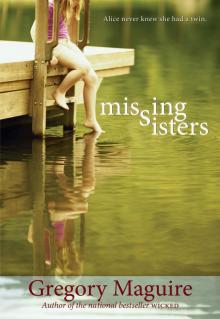 Missing Sisters
Missing Sisters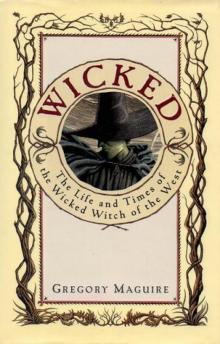 Wicked: The Life and Times of the Wicked Witch of the West
Wicked: The Life and Times of the Wicked Witch of the West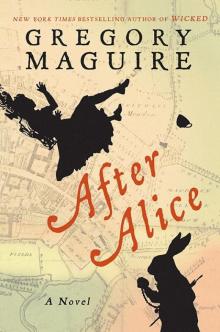 After Alice
After Alice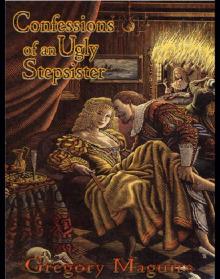 Confessions of an Ugly Stepsister
Confessions of an Ugly Stepsister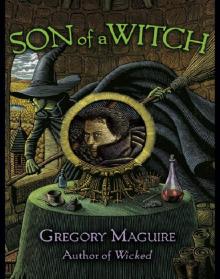 Son of a Witch
Son of a Witch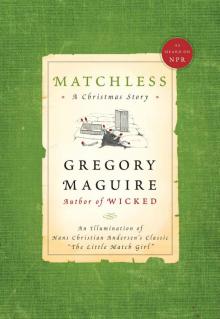 Matchless
Matchless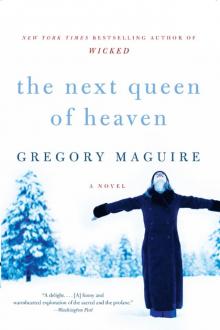 The Next Queen of Heaven
The Next Queen of Heaven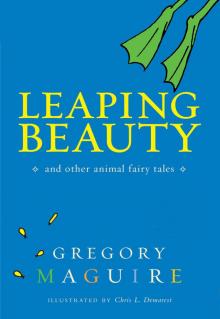 Leaping Beauty: And Other Animal Fairy Tales
Leaping Beauty: And Other Animal Fairy Tales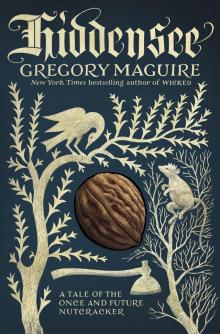 Hiddensee: A Tale of the Once and Future Nutcracker
Hiddensee: A Tale of the Once and Future Nutcracker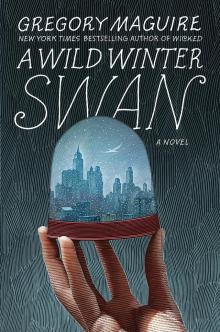 A Wild Winter Swan
A Wild Winter Swan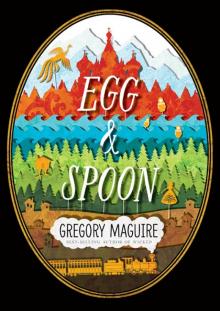 Egg & Spoon
Egg & Spoon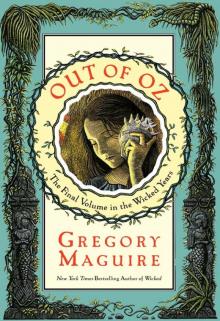 Out of Oz
Out of Oz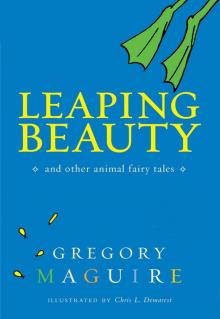 Leaping Beauty
Leaping Beauty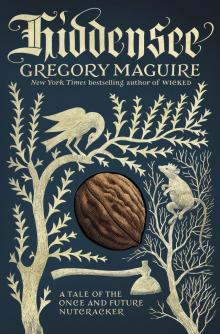 Hiddensee
Hiddensee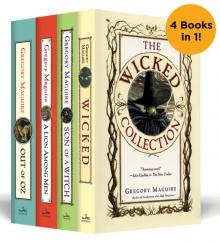 The Wicked Years Complete Collection
The Wicked Years Complete Collection The Next Queen of Heaven: A Novel
The Next Queen of Heaven: A Novel